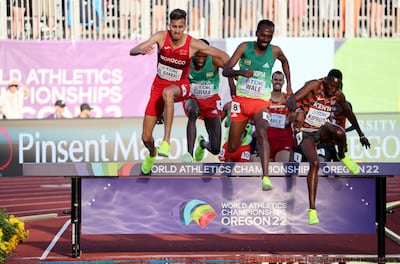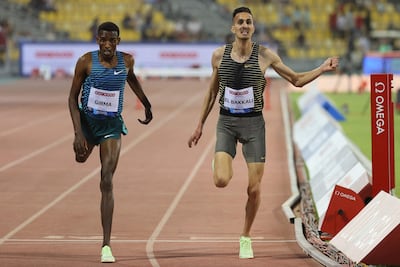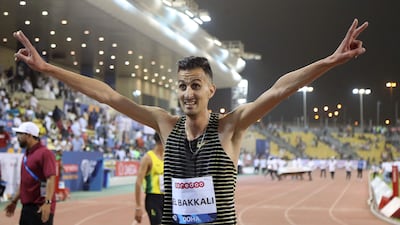Follow the latest news on the 2024 Paris Olympics
Ten years ago this week, Soufiane El Bakkali, then 18 years old and distinctively the tallest in the field, made his first global impression at an international championship. He finished fourth in the 3000m men’s steeplechase at the World Junior Championships in Athletics in Eugene, Oregon.
It was a promising marker of talent, albeit one shaped by the sort of fatalism that had characterised the men’s steeplechase for almost as long as anybody coming into the event for more than a generation could remember.
At those championships, the gold, silver and bronze medals went to Kenyan-born runners. No surprise there. It looked like a further signpost that an extraordinary national dynasty of excellence over the jumps, the water pits, the numerous injury hazards and the test of endurance and strategy that is the steeplechase was set to extend into a second half-century.
Here were the stark facts the young El Bakkali confronted when, as a teenager, he chose to focus his elite track career on the gruelling seven-and-half laps of multi-skilling that make up the steeplechase. Between 1984 and 2021, every Olympic gold medal in the men’s steeplechase was won by a Kenyan (and even that record was only compromised by Kenya’s boycotting the 1976 and 1980 Games). And from 1987, there was a 35-year monopoly of Kenya-born steeplechasers claiming gold at senior World Championships.
Suffice to say, Morocco’s El Bakkali has been one of sport’s great mould-breakers. When he claimed the Olympic gold medal in Tokyo three years ago it was a power-shift moment, comparable to, say, China being toppled from the summit at Olympic table tennis. Suddenly, Kenya were no longer kings in their private sporting domain. When El Bakkali eased past the Kenyan Abraham Kibiwot at the penultimate water pit and into third place at the Japan national stadium, North Africa had set up a coup.
He went onto overhaul two Ethiopians in a superbly measured stakeout of the Olympic gold, and fairly quickly remarked on the historic significance of his achievement: “I am so used to seeing Kenyans win,” he told reporters. “This was my opportunity to show Morocco is capable of winning this prize, ahead of the Kenyans. I have spent a long time comparing myself with the Kenyan and Ethiopian runners, seeing if I could reach the gold standard.”
Three years on, El Bakkali’s challenge is to show the Tokyo gold was not a brief interruption of East African sovereignty at the Games. The principal rival in Paris, where the heats for the men’s steeplechase take place on Monday, will be the Tokyo silver medallist Lamecha Girma, the Ethiopian who last year, in Paris, set the new world record time - 7:52.11 – for the event.
Girma and other rivals have drawn confidence from El Bakkali’s absence from meetings this year because of injury, although as the Moroccan, who missed two months of practice while in recuperation, told World Athletics, he has come to see beneficial aspects to his lay-off. “The injury was tough, but I was already well advanced in my Olympic preparations, and I now feel there were positives out of it. It allowed me to focus on being ready for the Games.”

He arrives in Paris armed with gold medals from the last two World Championships. Girma finished second to him at both and lives with an archive of haunting experiences of leading at major meetings until deep into the last lap with the 1.91m El Bakkali looming just behind him, confident that his finishing speed and those long legs will prove decisive in the business end of the race. So far, the late El Bakkali kick to the front has been decisive in the epic modern duel that is Girma, 23, versus the 28-year-old from Fes.
El Bakkali admits to feeling nerves ahead of big races, of “working on my self-confidence,” and that “there is a weight of expectation on me.” His country expects, above all. Back-to-back Olympic titles would elevate him into rare company. Despite Morocco’s distinguished history in men’s distance running, from Brahim Boutayeb to Said Aouita to Khalid Skah in the 1000m and 5000m, only Hicham El Guerrouj, winner of the 1500m and 5000m at the Athens Games of 2004, has ever brought two Olympic gold medals home.
Half a lifetime working with the same coach, Karim Tlemsani, who took El Bakkali under his tutelage when the athlete was 14, has helped established the tactical clarity that makes him such a feared opponent. He’s also admired for his hurdling technique, part of the diverse set of assets demanded by the steeplechase, where, bolted on to the stamina and race-planning of the middle-distance runner are requirements to leap over 35 barriers of just shy of a metre high, adjusting stride patterns appropriately, and to anticipate a deeper fall, into water, for seven of those barriers.

As often as not, there’s the extra jeopardy that somewhere along the route, a fallen athlete will present a sudden, unexpected obstacle to swerve.
That’s a unique portfolio of challenges for a track event. El Bakkali might have specialised in something more straightforward, like the 1500m at which he also excelled as a younger runner. But, he says, “I love the steeplechase. I was always obsessed with this event, even as a kid.”
When that kid grew into a lofty teenager, the strategic advice would have been that ultimate glory in the steeplechase comes with a fortified glass ceiling - unless you’re from Kenya.
When El Bakkali broke that Kenyan monopoly, handed his Olympic gold medal by compatriot Nawal El Moutawakel, the live, on-site audience was limited. The Tokyo Games took place under severe Covid-19 restrictions.
The Stade de France will feel very different, with significant numbers of supporters in Paris having travelled from Morocco and from within the large Moroccan community in France. If they see the tall man poised on the shoulders of the leading pack by the final bend, they will sense the omens for another gold are strong.


